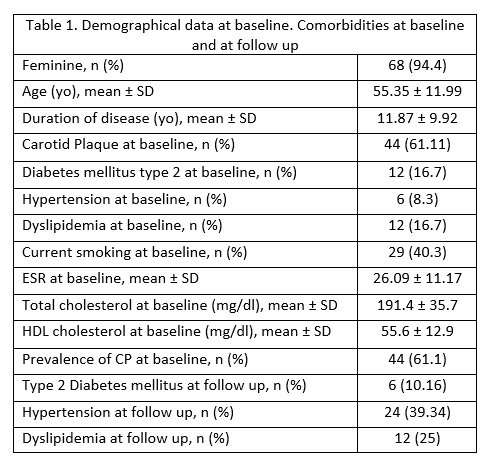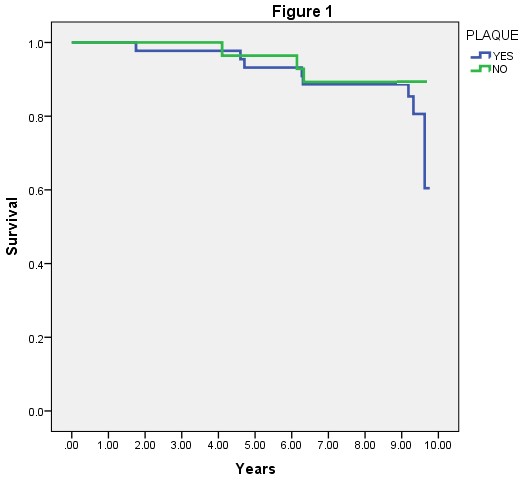Session Information
Session Type: ACR Poster Session C
Session Time: 9:00AM-11:00AM
Background/Purpose:
The main cause of mortality in patients with rheumatoid
arthritis (RA) is atherosclerotic cardiovascular disease (ASCVD). RA patients
have a 10-year decrease in life expectancy when compared to healthy controls. Reports
of ASCVD outcomes in Hispanic RA patients is scarce. The objective of the
present study is to determine the mortality of a Hispanic RA cohort followed
for a 10-year period, and its relation to the presence of carotid plaque (CP)
after initial carotid ultrasound evaluation.
Methods:
An observational, longitudinal, descriptive study was
designed based on a cohort that included 124 Hispanic patients with RA who
fulfilled the ACR 1987 classification criteria. A telephonic questionnaire was
applied to the subjects or family members to determine ASCVD-related mortality
and new onset of comorbidities (hypertension, diabetes, dyslipidemia, acute
myocardial infarction, stroke, arrhythmias, heart failure, angina, and chronic
kidney disease). A descriptive analysis of current and past comorbidities was
carried out. Survival analysis was performed with Kaplan-Meier curves. Log-Rank
test was used to compare between patients with and without carotid plaque (CP),
considering statistically significant a difference in mortality if a value of
p<.05 was obtained.
Results:
The original cohort included 124 subjects of which 52 were
lost to follow-up. A total of 72 patients were included in the analysis (Table
1). CP was present in 44 (61.11%) of the patients. Of the 72 patients, 11
(15.3%) had died: 7 (9.7%) of them due to ASCVD (4 myocardial infarctions, 2
strokes, 1 heart failure), 2 of non-cardiovascular
causes and 2 in traffic accidents. Diabetes mellitus type 2 was diagnosed in 6
(10.6%) of the remaining patients, hypertension in 24 (39.34%) and dyslipidemia
in 12 (25%). Only 1 patient had a non-lethal myocardial infarction. In the CP
group, 8 (18%) had died against 3 (10.7%) of the patients without CP (Figure
1). The majority of ASCVD-related deaths occurred in patients with CP, although
there was no difference in mortality (p=.373).
Conclusion:
ASCVD was the most frequent cause of death in this cohort.
In a 10-year period, there was no difference in mortality in RA in relation to
the presence of CP. Prospective studies with a greater sample are necessary to
corroborate this finding.
To cite this abstract in AMA style:
Vera-Pineda R, Cardenas-de La Garza A, Galarza-Delgado DA, Azpiri-Lopez JR, Colunga-Pedraza IJ, Munoz De Hoyos J, Serna-Peña G, Tovar-Jasso BB, Garza-Elizondo MA, Ornelas G. Rheumatoid Arthritis Patients with Carotid Plaque: 10-Year Follow-up [abstract]. Arthritis Rheumatol. 2015; 67 (suppl 10). https://acrabstracts.org/abstract/rheumatoid-arthritis-patients-with-carotid-plaque-10-year-follow-up/. Accessed .« Back to 2015 ACR/ARHP Annual Meeting
ACR Meeting Abstracts - https://acrabstracts.org/abstract/rheumatoid-arthritis-patients-with-carotid-plaque-10-year-follow-up/


